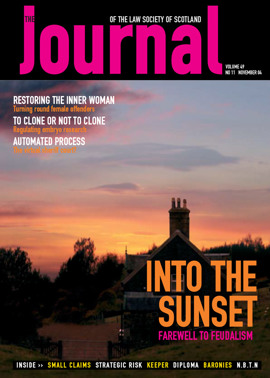Book reviews
AUTHOR: JOSHUA ROZENBERG
PUBLISHER: OXFORD UNIVERSITY PRESS
ISBN: 0 19 925056 1
PRICE: £18.99
The BBC suffered a great loss in 2000 when its excellent legal affairs correspondent, Joshua Rozenberg, joined The Daily Telegraph as legal editor. Legal print journalism is greatly enhanced by his writings, and so too is the world of legal literature with the publication of his book on the vexed subject of privacy.
Since the introduction of the European Convention on Human Rights into our domestic law, article 8 has given a guarantee that UK citizens will be afforded a right to privacy. But what does that mean? The courts in London, who, because of geography, tend to deal with most of the cases involving those who would seek to enforce a right of privacy, have refused to develop a free-standing tort named privacy. Instead they have extended the already developing law of confidence, which had life breathed into it in spectacular fashion in the late 1980s over the “Spycatcher” litigations in England and their Scottish equivalent, the Cavendish case.
Joshua Rozenberg avoids the classic lawyer’s error of spending at least 25% of a textbook in telling us what the law used to be. His journalist training gives him the opposite instinct. He tells us where we are now.
In a commendable first chapter entitled “Confidence or Privacy?”, he takes us through the considerable legal complexities of that dichotomy with commendable clarity. The author is clearly not only on top of his subject, but has the rare gift of explaining it in comprehensible terms to the legal reader. In subsequent chapters he takes us through the most recent and often hilariously funny litigations arising out of privacy/confidence.
But not only the case law is here. In chapter 3, we experience the concept of free speech and what that means in the privacy context. In chapter 4, we look at the extent of “respecting private life”. Chapter 5 deals with the question of statutory or voluntary regulation of the newspaper industry. The danger of “the chilling effect” of privacy on freedom of speech is tackled in chapter 6.
This book is a combination of a debate on the philosophical issues surrounding the whole question of a law of privacy combined with an excellent analysis of the recent court litigations. The author’s journalistic style means that this text could be read and understood by any reasonably intelligent reader, lawyer or not.
A procession of supermodels, prostitutes, politicians, TV celebrities and film stars march through the pages of this text. Of these, it is devoutly to be wished that at least the politicians may read this book in order that they may inform their future deliberations in the legislature on the subject. For those of us who practise media law, privacy is the new defamation. It should never be forgotten that privacy prevents the telling of the truth. There are many who would seek to suppress the truth, even in our democratic society. Sadly, today’s politicians are in the forefront of that suppression movement. That is why they should read this book.
Alistair Bonnington
In this issue
- Drafting consumer contracts
- Virtual firms: transactional learning on the web
- Ignorantia juris: it's all Greek to me
- Sheriff Court Rules Council consultation paper
- The Clinical Trials Directive - a summary
- Guarding the inner sanctum
- Neighbours in the global village
- Family law: is it the path for you?
- From sunset to sunrise
- What next for conveyancing?
- An ethical minefield
- Shredding the evidence
- Robbing the poor?
- Our dynamic profession
- A wider angle
- Keep the eye on the ball
- A rough guide to becoming a partner
- Rediscovering hope
- Sharpen your pencils
- Significant other
- Too far or not enough?
- Chipping away the infringers?
- View from Holyrood
- Website reviews
- Book reviews
- The Registers and the Appointed Day
- Feudal law: not just a relic
- Birth of a register






